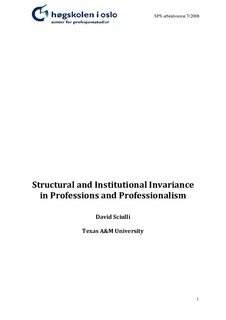| dc.description.abstract | Received wisdom in the sociology of professions revolves around two assumptions. First, professions cannot be distinguished either analytically or empirically from other expert occupations and middle-class occupations. Second, whatever consequences professionalism introduces into civil society or the state, all of these consequences are strictly socio-economic and, as a result, confined exclusively to the stratification system and occupational order. Professionalism does not and cannot contribute more grandly to “social order,” as Parsons believed, nor does it or can it in any other way affect at all, let alone uniquely, shifts in the direction of social change. In this paper I challenge received wisdom at these two core foundations with two sets of listings and discussions. In one set I list and discuss structural qualities constitutive of professions uniquely; this challenges the first assumption. In the other set I list and discuss institutional consequences which professionalism introduces uniquely into the larger social order. Being at once structural, institutional and invariant, these consequences of professions and professionalism, by definition, bear on the direction of social change. Moreover, they do so in ways which can be explained and predicted, both in cross-national research today and in historiographic analyses and comparisons. This challenges the second assumption. | en |
